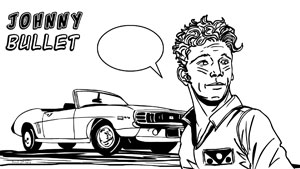|
|
 |
I stumbled upon this comic book and kept reading it. Although influenced in themes and art by yaoi, a Japanese gay genre, TJ and Amal was American. TJ and Amal can appeal to any comic and non comic reader. It explored second generation Indian immigration through a classic American genre; the buddy road trip. It was one of the leading comic books crafting a new genre through online reach. Much of the drama in TJ and Amal was subtle. The entire final chapter was almost told without any text captions.
Weaver’s last chapter was difficult to understand. Readers had to recall specific sequences from a 500 pages Web comic published for years. Unlike in a printed comic book read in several books or at once, recalling subtle references is difficult in Web comics. The reader cannot flip pages to scan past chapter to fill in the storytelling gaps that would make a subtle chapter easier to grasp. That’s one limit of the digital comic book format. It’s easy to go to previous pages. Yet even if the user interface is good, flipping a few pages manually to scan information from past sequences is easier. Thus this technological limit affected the weight and appeal of the ending of TJ and Amal. Weaver wanted readers to rely only on her visual storytelling without meta-fictional narrative notes.
Some potential readers on the sidelines feared the gay sex contents. In this comic, this rated material was minimal and discreet. Discretion and subtlety are Weaver’s most persistent qualities. Even the artwork showed a minimalism and reliance on deconstructing visual information. Much of the meaning the reader gets after reading TJ and Amal is personal. While Weaver had her own interpretation of the events she created in this Web comic, readers can have their own too.
The entire Web comic is available as a three-book set or as individual volumes through Weaver’s Website. I’m not sure why she prefers to sell her products herself. Third party retailers and distributors like Amazon take a huge percentage of sales. Selling her books herself, Weaver is like a digital artisan. She sells her craft to one client at a time. Some say the information age separates people. Still, Weaver maintains a direct connection with each of her readers.
I’m not sure what other project Weaver is working on but I hope that she continues to explore Web comics as her main medium.
© Copyright 2002-2026 by Toon Doctor Inc. - All rights Reserved. All other texts, images, characters and trademarks are copyright their respective owners. Use of material in this document (including reproduction, modification, distribution, electronic transmission or republication) without prior written permission is strictly prohibited.

